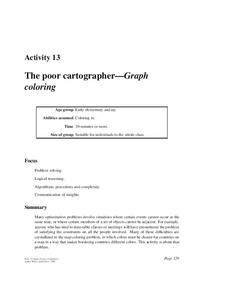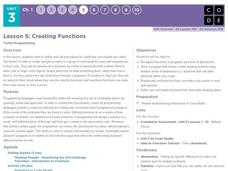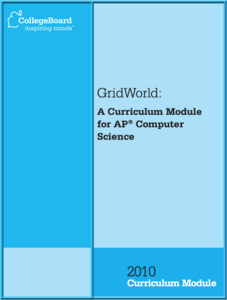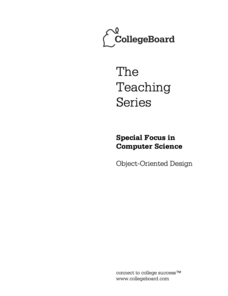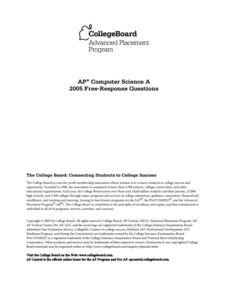Curated OER
Multiplying in Columns, Standard Way
In this multiplying and carrying worksheet, students compare the standard algorithm with the multiplying in parts method and their examples, choose which method to use, and find the products. Students solve twenty problems.
Curated OER
Polygons
In this geometry instructional activity, students use Kruskal's algorithm to analyze and solve shapes as it relates to cost. There are 4 questions with an answer key.
Curated OER
Gradient Search
Students explore the concept of a gradient search. In this gradient search lesson, students use the Gradient Search Algorithm to locate critical points, maximums, minimums, and answer questions in this problem solving lesson.
TryEngineering
Solving Problems with Decision Trees
Combat crime with computers. The lesson teaches young computer scientists about decision trees and how to use them. They consider telecommunications subscriptions and how decision trees can help detect fraud.
TryEngineering
Search Engines
Learn how to find things quickly and efficiently on the Internet. The lesson teaches how search engines work and how to efficiently use them. It includes an activity where groups develop search queries to find sites using given criteria.
Curated OER
Rational Number Project
Infuse your unit on fractions, decimals, and operations with a thorough module about rational numbers. With a teaching guide, learner examples, templates for instruction, and lesson rationale, the module is a solid way to emphasize the...
Computer Science Unplugged
The Poor Cartographer—Graph Coloring
Color the town red. Demonstrate the concept of graph theory with a task that involves determining the least number of colors needed to color a map so that neighboring countries are not represented by the same color. Pupils make...
Computer Science Unplugged
Ice Roads–Steiner Trees
As an introduction to Steiner Trees, class members are challenged to find the shortest paths to connect multiple points. The teacher introduces the problem by showing how to connect three points. Groups then go outside and construct a...
Code.org
Sending Binary Messages with the Internet Simulator
Show your class how to develop a protocol to solve a problem. Pupils then continue with working with binary messages but refine a protocol to assist with the distinction of individual bits by including a bit rate. Finally, the pairs use...
Code.org
Encoding and Sending Formatted Text
Introduce your class to encoding text. Pairs work together to create a protocol to send text prior to learning ASCII encoding. Groups then collaborate to send and translate ASCII codes creating a formatted text message.
Code.org
Creating Functions
Quit repeating yourself ... you can make this simpler! Rather than repeating the same set of code over and over, class members learn to build and call functions in a series of challenges in App Lab. In the end, they combine functions to...
Code.org
Functions and Top-Down Design
Let me break it down for you! Introduce your class to a way of breaking up a complicated task into its component pieces. Individuals draw a complex figure using JavaScript and then break it down to help determine the functions needed in...
Code.org
APIs and Using Functions with Parameters
Introduce your class to the API, a reference guide that lists and explains the functionality of programming language. Using JavaScript, individuals draw complex designs that require additional commands and parameters defined in the API...
Code.org
Creating Functions with Parameters
The pupils practice modifying parameters in a function to add variations to their under the sea scene. The resource also introduces random number functions that alter the scene every time the program runs.
Code.org
Looping and Random Numbers
Repetition, repetition, repetition. Get your class to efficiently repeat a section of code over and over again by introducing looping. Class members learn looping to quickly recreate objects they want to appear more than once in their...
Code.org
Practice PT - Design a Digital Scene
The final performance task for the unit requires class members to utilize what they have learned to create a personal digital scene. Groups work together to develop a scene and then, using top-down design, break the scene into manageable...
College Board
2008 AP® Computer Science A Free-Response Questions
Get the code right. A detailed resource provides pupils and teachers of computer science courses with released items from the 2008 exam. Questions range from studying code in a case study to creating code to perform specific tasks....
College Board
Strategies for Teaching AP Computer Science
Implement strategies from the beginning to the end. A collection of strategies and lessons span from the first day of school to after the exam. Resources cover basic information such as computer ethics and top 10 tips to a lesson on how...
College Board
GridWorld: A Curriculum Module for Computer Science
Stretch out the grid. Teaching modules provide suggestions on how to use the case study, GridWorld, throughout the year as opposed to only right before the exam. The instructional units provide suggestions for presentations, assignments,...
College Board
GridWorld Case Study
The gridline is not just for Friday. Created for the first year, the GridWorld case study was part of the Computer Science course, the resource provides suggestions for integrating it throughout the course. Four instructional components...
College Board
2002 AP® Computer Science A Free-Response Questions
Find the data in an array. Questions for the 2002 AP® Computer Science exam provide opportunities for practice using their ability to use an array structure. Four questions provide different scenarios to use arrays. Pupils then create...
College Board
1999 AP® Computer Science A Free-Response Questions
Assess an array of using coding. Pupils develop code to respond to four questions dealing with arrays. The questions range from determining who in a list are seniors and generating a pattern for a quilt. The questions are the first time...
College Board
Object-Oriented Design
Just jump in with both feet. To better teach Java, one must think Java. The College Board built document immerses teachers in object-oriented design by providing several resources for use. Resources include teaching strategies, design...
College Board
2005 AP® Computer Science A Free-Response Questions
Four free-response questions from the 2005 AP® Computer Science exam show pupils how topics appear on the test. Scholars use the questions to practice coding skills in preparation, while teachers use the items to determine what concepts...
Other popular searches
- Numerical Algorithms
- Division Algorithm
- Multiplication Algorithms
- Addition With Algorithms
- Addition Algorithms
- Subtraction Algorithms
- Standard Algorithm
- Math With Algorithms
- Partial Products Algorithm
- Partial Sums Algorithm
- Adding Integers Algorithm
- Dividing Algorithm








